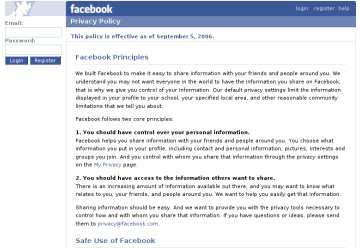 You’re probably taking part in one right now : you write about how your day was on an online journal, and check out how your friends are doing on theirs. You might have a profile on another site, sharing music or photos to friends and maybe complete strangers who’ve linked their profiles to yours, and if you’re feeling particularly romantic you might try online dating. Sites like the ones offering these services promote the creation of online social networks, where you keep in touch with old friends, and make new ones with people who share your interest, but might never meet outside the web.
You’re probably taking part in one right now : you write about how your day was on an online journal, and check out how your friends are doing on theirs. You might have a profile on another site, sharing music or photos to friends and maybe complete strangers who’ve linked their profiles to yours, and if you’re feeling particularly romantic you might try online dating. Sites like the ones offering these services promote the creation of online social networks, where you keep in touch with old friends, and make new ones with people who share your interest, but might never meet outside the web.
Sounds like a good thing, all in all. Except for the issues dealing with privacy.
Privacy. In its basic sense, it’s all about keeping certain things that you want to keep to yourself private. It’s always important to safeguard your personal information, especially with people ready to use it for criminal acts against you. But it leads to a tricky situation when you’re dealing with social networking sites, where you might not be aware you’re giving this same information away. After all, popular sites like MySpace allows visitors not logged in to the site to visit profiles. And recently Facebook, a social networking site geared for college students, faced protests from its users when they announced the news feed feature. Users felt it was a breach of their privacy, going so far as to call it stalking, even if most of the information you can get from these were things readily available to their friends. Though the clamor has died down, and Facebook has added privacy settings, the users are now aware how much information Facebook can actually share.
It’s a fact that since Facebook is the one providing the services to connect users to each other, they can make changes in their privacy policy and how they give those services to the users. Users might not like these changes, but they must accept it, or shift to another service. Facebook, and other companies like it, should also take their users’ possible reactions to any percieved attack on their privacy if a situation like this arises again.